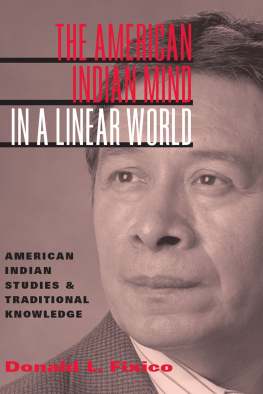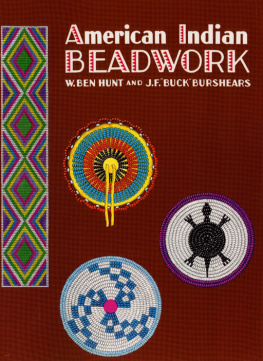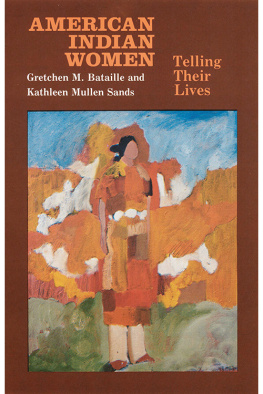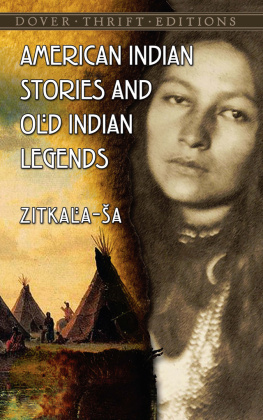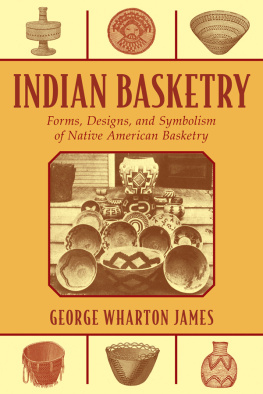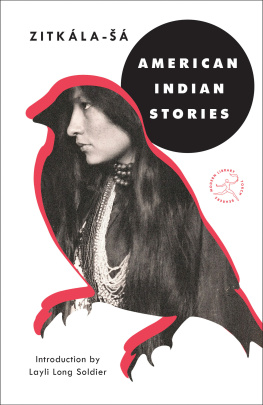THE AMERICAN INDIAN MIND
IN A LINEAR WORLD
THE AMERICAN INDIAN MIND
IN A LINEAR WORLD
American Indian Studies and
Traditional Knowledge
Donald L. Fixico

First published by
The Haworth Press, Inc
10 Alice Street
Binghamton, NY 13904-1580
Reprinted 2009 by Routledge
Routledge |
Routledge | Tylor & Francis Group |
Tylor & Francis Group | 2 park square |
270 Madison Avenue | Milton Park Abingdon |
New York, NY 10016 | Oxon OX14 4RN |
Copyright 2003 by Taylor & Francis Books, Inc.
Routledge is an imprint of the Taylor & Francis Group.
Printed in the United States of America on acid-free paper.
All rights reserved. No part of this book may be reprinted or reproduced or utilized in any form or by any electronic, mechanical, or other means, now known or hereafter invented, including photocopying and recording, or in any information storage or retrieval system, without permission in writing from the publishers.
10 9 8
Library of Congress Cataloging-in-Publication Data
Fixico, Donald Lee, 1951
The American Indian mind in a linear world : American Indian studies and traditional knowledge / Donald L. Fixico.
p. cm.
Includes bibliographical references and index.
ISBN 0-415-94456-2 ISBN 0-415-94457-0 (pbk.)
1. Indian philosophyNorth America. 2. Indians of North AmericaPsychology. 3 Indians of North AmericaEducation. I. Title: American Indian studies and traditional knowledge. II. Title.
E98.P5F59 2003
1913.089397dc21 2002037051
An earlier version of appeared in the Journal of the West, Vol. 39, No. 1. Copyright 2000 by Journal of the West, Inc. Reprinted with permission of Journal of the West, 1531 Yuma, Manhattan, KS 66502 USA.
To
My grandmother,
Lena Spencer Fixico
Whose beliefs and traditions are my strengths
TABLE OF CONTENTS
LIST OF ILLUSTRATIONS
Sequoyah (Cherokee).
Wilma Mankiller, former Cherokee Principle Chief.
Gertrude Bonnin Zitkala-Sa (Lakota).
Alexander Lawrence Posey (Creek).
Clock in Cherokee language.
Shawnee Indian School Children in 1902.
Alfonso Ortiz, Tewa Pueblo scholar.
Carlos Montezuma, Yavapai physician.
PREFACE
As a child raised in the Seminole and Muscogee Creek traditions, I used to watch our elderly men at our campground talk as they spoke the native language and sat under an arbor. Our ground is Gar Creek, near Seminole in Oklahoma. The men sat close to the Earth, and with sticks they drew on the ground to illustrate points they were talking about. This was the way things were done, talking about all that was concerned and related. This is the way of my people, and I am a part of it and so are my relatives, especially my grandmother, who I remember so well even though she passed away many years ago. My grandmother was the matriarch of our camp, and her way of doing things and her logic was in the SeminoleCreek tradition. Her ways of doing things were taught to me as I learned from my relatives and elders, as they saw the world and the universe in a special way. This native ethos has remained much a part of me, and it is the same for all American Indians who are close to their tribal traditions. In our world, relationships are important and sustaining them is valued.
Many years ago as a child in grade school, I often wondered why I thought in a different way than my classmates, and why I did things differently from a mental point of view. My fourth-grade teacher at Star Elementary School in Oklahoma City, Oklahoma, where we lived, was teaching our class how to do mathfractions. Fractions have sometimes been the bane of frustration for fourth-graders, especially for those who do not do well in math. But I usually did well in the subject. It is just that I thought about solving math problems in a different way. Most of the time, I was convinced that I was wrong, but I came up with the answer to the question that the teacher had asked. What was confusing, besides this point, was how the teacher had arrived at the same answer. I often wondered if I was the only one thinking the way that I did, and usually I was the only American Indian in school, except for my brother, who was two years younger. I may not have used the logical way of solving a problem as taught by my teacher, but my way was logical to me from my point of view. Later, I wondered if other Indian people thought the same way that I did, and I found that Indians raised in traditional ways did think in a distinctive way. I began to understand that one perspective is just as valid as another in solving problems and responding to questions, although the American mainstream does not typically hear or pretend to begin to understand different points of view for fear of their authority being challenged.
Thinking Indian or Indian thinking is the native logic of American Indians, based on their tribal cultures and how they see the world and the universe. Traditionalists view the world according to relationships with the natural environment and a circular philosophy based on cycles of seasons, migrations of animals, and the rotations of the Earth and the stars.
Given the scope of Indians and education, this book spans a length of relations from the polarized positions of the traditional mind of the tribal full blood to the Western mind of empirical evidence. As a policy historian and ethnohistorian, I approached this study as an ethnohistorical examination of the Indian point of view involving indigenous thought. Cultural analysis is also involved. In between, the traditional Indian mind and the white linear mind is the majority of the Indian population, which is mixed blooded and educated in the mainstream school system, especially during the twentieth century. Hence, this study strives to explain the complexity of the American Indian mind in its traditional cultural and natural environment. This indigenous ethos is the focus while demonstrating how this perspective has evolved toward the linear world and how modern Indians have adapted their thinking to adjust to the American mainstream.
Indian thinking is argued in this book to be visual and circular in philosophy. Imbedded in an Indian traditional reality, this ethos is a combination of the physical reality and metaphysical reality. Listening and observing the natural environment is essential to the Indian mind-set. Decision making is responsive in nature due to considering all of the physical and metaphysical factors affecting one's life. Coming to a consensus is coming to a balance of all factors so that the right decision is the best decision for all concerned. Although this logic may not be direct, it includes human and nonhuman entities. This type of thought .
addresses the importance of story about truths and its multiple purposes and how they can teach people to learn. The power of story through the oral tradition is also explained and how all of this transcends time, thus making time less relevant to the power of oral narrative told effectively. Story is the basis of traditional knowledge, and such knowledge is explained as well.
In , which demonstrates the distinction of the linear mind set and how this mind set has led to a Western mentality.
on the Indian genius and native intellectual addresses the point that Indian intellectualism has been grossly neglected by mainstream academia, and how the American public does not consider Indian people to be intellectuals. It has been an uphill battle for sufficient recognition of Indian intellectuals in comparison to other minorities and mainstream scholars. The final point is that Indian genius and the American Indian mind is all about understanding relation-ships. Seeing all relations within the totality is the source of traditional knowledge, thereby manifesting a traditional ethos from various tribal perspectives. These points set up the scene for the continual conflict of the traditional mind set of early boarding-school Indians struggling with white teachers in linear-taught schools.

